News from the Institute
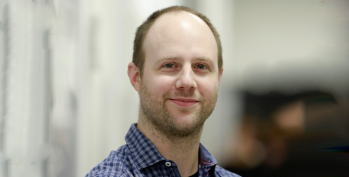
Christian Münch, group leader at the Institute of Biochemistry II of Goethe University Frankfurt, won the Binder Innovation Prize 2020 awarded by German Society for Cell Biology. It recognizes his groundbreaking work on translation control by stress responses for which he developed novel methodology and that also provided new insight into the biology of SARS-CoV-2.
... (read more)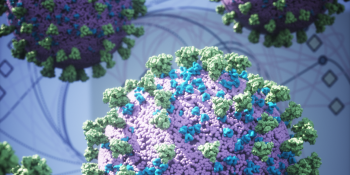
New therapeutic targets preventing SARS-CoV-2 replication.
Researchers around IBC2 Group Leader Christian Münch comprehensively analyzed the response of human host cells to SARS-CoV-2 infection and identified growth factor receptor (GFR) signaling as essential for SARS-CoV-2 replication. GFR signaling plays important roles in various diseases. Five different drugs targeting GFR signaling prevented production of SARS-CoV-2 particles in cells. These results are now published in Molecular Cell.
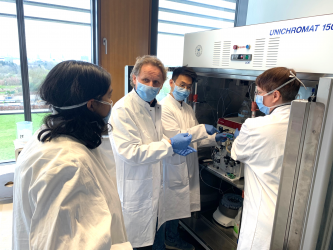
Molecular differences between SARS and SARS-CoV-2
Scientists from IBC2 and collaborating teams identified the papain-like protease (PLpro) of SARS-CoV-2 as an essential viral enzyme and potential weak spot. PLpro is required for the processing of viral polypeptides and the assembly of new viral particles within human cells. In addition, SARS-CoV-2 uses this enzyme to dampen the anti-viral immune response, helping the virus to modulate the host’s immune system to its own benefit. By this, the virus can easily multiply and spread further. The team has demonstrated that pharmaceutical targeting of PLpro by a non-covalent inhibitor (GRL-0617) blocks virus spread and increases anti-viral immunity in human epithelial cells, the prime site of pathogen entry. The respective results are now published in Nature.
... (read more)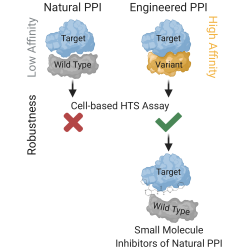
Weak binding affinity between two interacting proteins is very beneficial for cellular signaling cascades, ensuring their dynamic ON/OFF regulation. However, weak affinity of protein-protein interactions (PPIs) also represents a major obstacle in chemical screening. The root of the problem is a lack of approaches for targeting such interactions, ultimately limiting our abilities to discover novel medicines. In an article published in Cell Chemical Biology, Maculins et al., 2020 describe an innovative approach to chemical screening.
... (read more)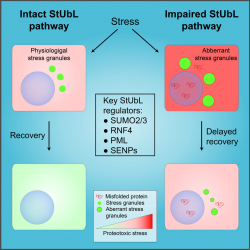
As published in Molecular Cell today, the Müller group has discovered a unique link between SUMO-mediated nuclear protein quality control and cytosolic stress granules (SGs). SGs are ribonucleotide particles that represent a prototypic example of membrane-less organelles. SG assembly is an important stress response that limits protein synthesis to avoid further influx into overloaded proteostasis systems. Typically, SGs rapidly disassemble when stress resolves. This process is impaired in amyotrophic lateral sclerosis (ALS), a neurodegenerative disease, due to mutations in RNA-binding proteins such as FUS or TDP-43. Jan Keiten-Schmitz and coworkers now found that the proper disassembly of SGs upon release of heat or arsenite stress requires both SUMO chain formation and the SUMO-targeted ubiquitin ligase (StUbL) RNF4. Strikingly, they could show that this pathway limits the accumulation of an ALS-causing FUS mutant in SGs. Taken together, these data demonstrate that the StUbL pathway is intricately linked to the dynamics of SGs and might be exploited therapeutically in ALS.
... (read more)